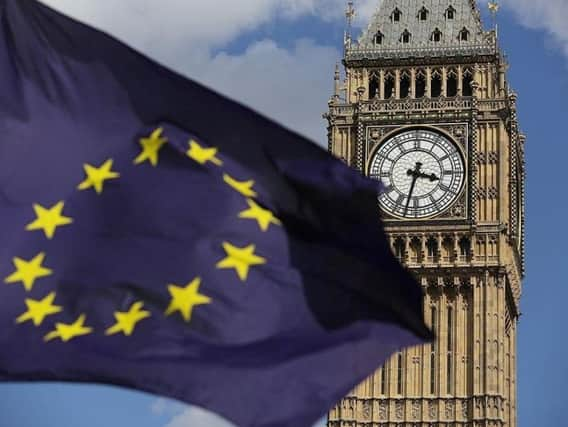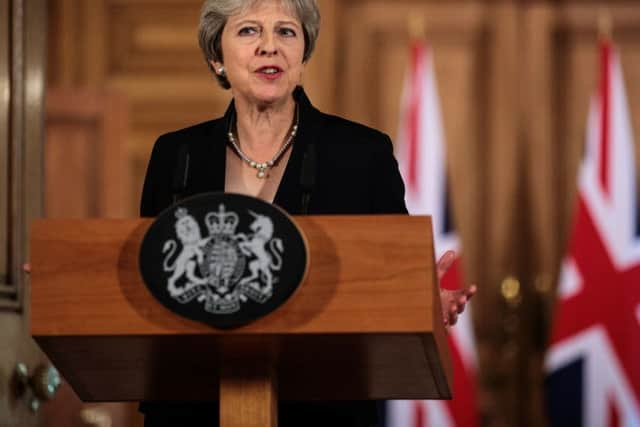Chris Haskins: Why the status quo would trump economic uncertainty of Brexit in second referendum


Her constant reassertion of three non-negotiable red lines – withdrawal from the Single Market, the Customs Union and from being bound by the European Court of Justice – give her little space for negotiation.
And the EU has reaffirmed its own red lines. The four free movements within the Union – goods, capital, services and power – will not be diluted for the sake of the UK. Breaking any of these, goes the argument, puts the whole edifice of the EU at risk.
Advertisement
Hide AdAdvertisement
Hide AdAttitudes to the Irish question are also unyielding and inflexible as long as Mrs May relies on the Democratic Unionist Party for a majority in the House of Commons. The DUP strongly supported Brexit in the referendum, even though a sizeable majority of the people in Northern Ireland voted to remain.


Anything which might weaken links with the rest of the UK is anathema to the Unionists who still view the Good Friday agreement, which is designed to bring the North and South closer together, with suspicion.
So an impasse looks increasingly likely, and the UK may well turn to a “no deal” WTO solution, whose consequences have been spelt out by the Government – Brexit at the expense of severe economic uncertainty and disruption. The majority in Scotland and Northern Ireland who voted to remain will be disillusioned with continued membership of the Union and could be persuaded that a better option might be Scottish independence and an all Ireland federation, in other words the end of the United Kingdom.
A “no deal” option, or indeed any other Brexit proposal, requires the approval of Parliament. It is difficult to see how any proposition, from a soft one to a hard one or a “no deal”, could attract a majority because of the deep divisions of opinion on the issues, especially in the Conservative Party. (A Labour Party abstention which might have been the preferred position of a Eurosceptic Jeremy Corbyn is no longer conceivable).
Advertisement
Hide AdAdvertisement
Hide AdIf she is defeated, Mrs May has three options – to call a general election which she did last year with disastrous consequences; to call a second referendum or to resign. Though she appears to have ruled out all three, she probably would have a better chance of winning a referendum than a general election, but the cost may be a split in her party.
I would reluctantly support a referendum, although I think that voters do not deal with the questions on the ballot sheet, and they vote to voice their discontent with anything on their mind. I suspect the Remain camp would win, but not by much.
A second referendum, unlike its predecessor, would offer voters the option of a status quo – or a leap into the unknown which, on the Government’s own admission, would be economically risky and disruptive to daily lives,
In a choice between the status quo and no deal, I would make the following points:
Advertisement
Hide AdAdvertisement
Hide AdThe status quo retains the generally acknowledged economic benefits of EU membership whereas “no deal” is widely recognised to be economically damaging, at least according to Jacob Rees-Mogg, for the first 50 years.
The status quo means no change in Ireland, whereas “no deal” would necessitate the introduction of border controls.
The status quo would reflect what the majority of voters in Scotland and Northern Ireland want, whereas a no deal could put the Union at risk.
Should restore confidence in sterling whereas “no deal” would probably weaken the currency.
Advertisement
Hide AdAdvertisement
Hide AdThe status quo would restore investor confidence whereas “no deal” would lead to drastic disinvestment by companies trading extensively with the EU.
The status quo would maintain the free movement of travellers and holiday-makers across the EU. “No deal” means long queues at custom barriers.
The status quo would maintain a wide range of regulations which we take for granted as being generally beneficial, (health and safety, air traffic, the environment, fair competition, professional standards, and, yes, jobseekers). A “no deal” would put all this in the melting pot.
The status quo would maintain extensive security arrangements and collaboration between European and UK universities.
Advertisement
Hide AdAdvertisement
Hide AdYorkshire would be affected by all these issues but, in addition, the status quo protects our farmers and our extensive trade links with Northern Europe.
Finally a second referendum would give voters the chance to reflect on the myths and fallacies pedalled by Michael Gove, Boris Johnson, Nigel Farage and others last time out. For both sides, a second referendum is risky, but because a Parliamentary stalemate exists, it seems the only way out of the mess.
Chris Haskins is a peer, farmer and businessman. He lives in East Yorkshire and is writing in a personal capacity.